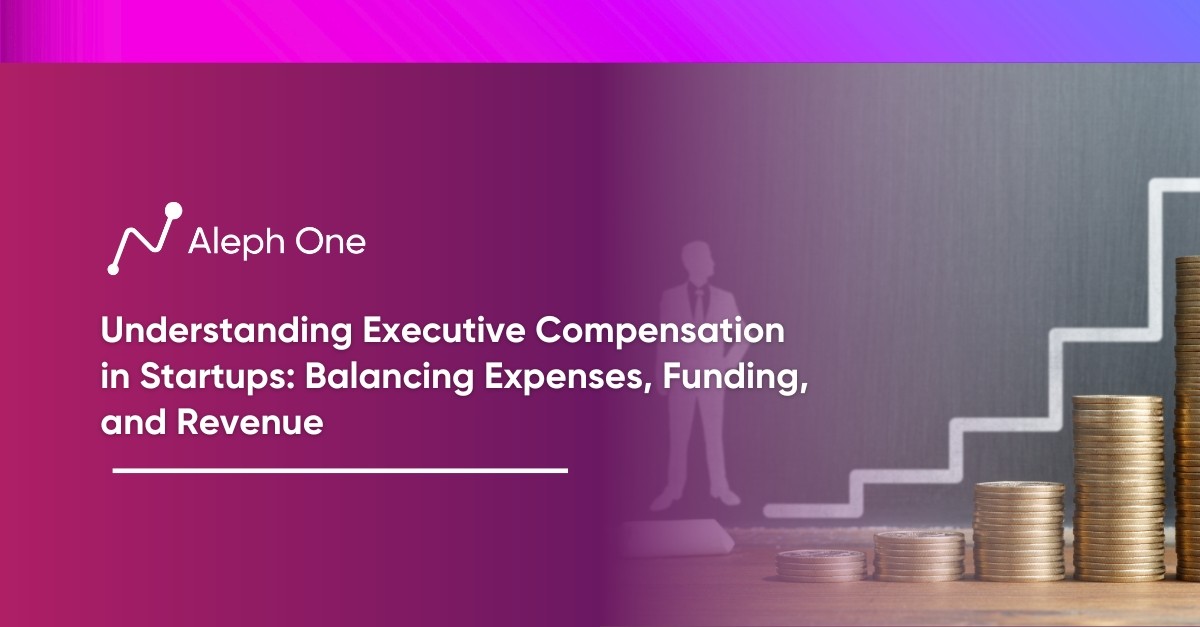Let’s work together to build something amazing. Share your project details and our team will reply to figure out the next steps to your success.

Executive compensation in startups is widely debated, with many questioning whether startup CEOs and founders are overcompensated. This article sheds light on this debate by exploring the challenges of balancing expenses, funding, and revenue regarding executive pay. It will dive into the importance of equity compensation, its alignment with investor interests, and how IPOs and acquisitions can impact executive pay.

The Million-Dollar Question: Are Startup Founders Overpaid?
Startup CEOs and founders are frequently criticized as being overcompensated. When news breaks of a startup raising millions in funding and the founder takes home a sizable payday, it’s common to hear accusations of overpayment. But are these criticisms fair or justified?
There is an ongoing debate about whether startup founders deserve multimillion-dollar pay packages. The “startup lottery” mindset argues that compensation is to be compensated for taking on risk, especially given the odds of success. If a startup beats the odds and successfully exits, the founders have earned a fortune for creating substantial value.
The Risk of a Startup Founder’s High Salary
Some argue that the pay of some startup founders has become excessive and disproportionate to the value created. According to some estimates, the average salary for startup CEOs in Silicon Valley has reached over $500,000. While this may be a fraction of pay at large companies, critics argue these levels are too high. Concern exists that founders can reduce “runway” and doom startups.
There are good arguments on both sides of this debate. Ultimately, the fairness of a founder’s pay should be evaluated based on the value they create through building a successful company, not just the absolute amount of their compensation. A multimillion-dollar payday is likely well deserved if a founder can turn a startup into a billion-dollar company. But founders should aim to pay themselves in moderation and prioritize extending the runway to give their startups the best chance at success. With oversight and transparency, startup boards and investors can help determine the founder’s compensation that motivates them to maximize value creation.
Aligning Interests: Why Equity Compensation Matters
For startup founders and employees, equity compensation—like stock options and shares in the company—is often far more valuable than salary alone. Equity aligns the founders’ interests with those of investors and helps motivate everyone to grow the company as much as possible.
How Do Stock Options Work?
Founders and early employees receive stock options, which give them the right to buy shares of the company stock at a low price. As the startup grows and raises more funding at higher valuations, those shares become more valuable. The shares can translate into a considerable payout for founders and staff if the company successfully exits via an IPO or acquisition. If the startup fails, the stock options and shares are worthless.
Some famous examples of founders who gained and lost fortunes based on equity include Evan Spiegel of Snapchat, who became a billionaire after Snap’s IPO, and Elizabeth Holmes of Theranos, who lost her fortune when the company was charged with fraud and dissolved.
Equity Compensation Reduces “Agency Problems”
For investors, providing equity compensation also makes sense. It means founders and employees only get a payout if the company has a successful exit in which investors also make money. This alignment of interests helps reduce the risks of motivational issues or “agency problems” where founders act in their self-interest rather than the company’s best interest.
In the end, equity compensation benefits both founders and investors. It allows founders to build wealth by owning the company they created. For investors, it helps ensure that startup teams are motivated to maximize growth and achieve the best possible outcome. Equity compensation can be a win-win for all parties involved when done right.
The Art of the Exit: How IPOs and Acquisitions Impact Pay
The ultimate payoff for startup founders and employees is when their company achieves liquidity through an initial public offering (IPO) or acquisition. These exits can turn equity compensation, like stock options and shares, into multi-million dollar payouts. Not surprisingly, the prospect of a considerable payout fuels the “startup lottery” mindset that attracts many to work for startups.
Successful Startup Exits
In recent years, mega-exits like Facebook’s IPO and acquisitions of startups like WhatsApp have led to eye-popping payouts for founders and early employees. Facebook’s IPO turned founder Mark Zuckerberg into a billionaire, creating over 1,000 millionaires among employees. The $22 billion acquisition of WhatsApp netted its founders, Jan Koum and Brian Acton, over $6 billion. Deals of this scale have significantly raised pay expectations for startup founders and executives.
However, for every startup that achieves a life-changing exit, thousands of others fail or achieve more modest outcomes. The reality is that most startups do not end in a massive IPO or acquisition. Founders and employees may hold onto equity for years with no payout or ability to cash in their shares. This highlights why equity compensation is so risky and potentially overvalued.
When startups achieve a significant exit, the payouts to executives are often controversial and seen as excessive by critics. Proponents argue these payouts reflect the value the executives created for investors and are well-deserved rewards for years of hard work building the company.
The prospect of gaining significant wealth through an IPO or acquisition drives the startup ecosystem, but fuels pay inflation and unrealistic expectations. Major exits for startups using equity compensation are the goal, but also a double-edged sword that can attract scrutiny and controversy over pay. The key to a successful exit is to achieve the right balance of incentivizing executives and retaining enough value for investors and employees.
Oversight and Regulation of Startup Pay
Startups may be innovative with their tech products and services but still have shareholders and investors to answer to. Boards of directors, venture capital firms, and other investors aim to provide oversight over how startups pay their executives, especially founders. They want to see fair and aligned performance compensation, not just a founder rewarding themselves.
Compensation Consultants
In recent years, compensation consultants have gained prominence as a way for startups to determine appropriate pay levels and how they are being objective. These consultants analyze factors like the startup’s growth stage, comparable pay at other startups, and specific job responsibilities to recommend pay packages for executives and board approval. However, some critics argue consultants are also incentivized to push for higher pay to please their clients.
“Say on Pay” Provisions
“Say on pay” provisions are another method some startups use to provide more pay accountability. They allow shareholders and investors to vote on and approve the compensation for top executives. While the votes are not always binding, they force startups to be more transparent on their pay rationale and consider shareholder interests. A negative say on the pay vote can also blow a startup’s reputation. However, not all startups have voluntarily adopted these provisions.
Golden Parachute
Regulations like “golden parachute” aim to curb excessive severance pay for executives, but loopholes still allow multi-million dollar payouts. Section 280G of the Internal Revenue Code limits tax deductions for “excess parachute payments” but only applies to public companies and those with significant assets. Startups can still award generous severance, just without the tax benefits.
More can be done to improve oversight and align pay with startup performance. Boards should push for more disclosure on compensation, especially at the CEO level, and consider shareholder input through provisions like say on pay.
Regulations must be strengthened to prevent abuse, not curb pay genuinely tied to long-term value creation. With greater transparency and accountability, startup executive pay can reach a proper equilibrium.
A Delicate Balancing Act: Pay, Growth, and Runway
Determining appropriate pay for executives and employees is a challenging balancing act for startups. On the one hand, startups need to pay well enough to attract and retain top talent who can drive growth. On the other hand, every dollar spent on pay reduces a startup’s runway—the amount of time left before it runs out of capital.
Risk of High Pay and Startup Perks
Paying founders and executives too much too soon can prevent a startup from failing. If a startup blows through its funding on lavish pay and perks, it will need more left to build its business. Many startups have been unable to raise substantial funding because they spent heavily on compensation, hiring, and office space before proving their business model.
Startup Strategy for Balancing Pay, Equity, and Performance
Startups have to be strategic in balancing pay and growth with fiscal responsibility. They should pay at or slightly below market rates for most positions. Equity compensation in the form of stock options or shares can be used to motivate employees without large cash payouts. Perks should be minimal and tied to company performance. Bonuses and pay raises should only be given when key milestones are achieved.
Figuring Out the Appropriate Pay for Founders
For executives and founders, pay should start low, ideally below $200,000 a year. Most compensation should be in equity that vests over time based on hitting key performance targets. This aligns incentives and means executives will earn large payouts only if they can grow the company and benefit investors. Some startups have set founder pay at just $1 per year to maximize available capital.
Board Oversight on Startup Founder and Executives Compensation
Startups also need oversight and governance to ensure pay stays in check. Boards should review and approve pay proposals, especially for executives. Compensation committees can help determine fair pay and equity packages based on the startup’s stage and financial position. Say-on-pay provisions give investors a voice on income without making it legally binding.
With strategic, performance-based pay and strong oversight, startups can attract top talent without lavish compensation that puts the company at financial risk. The key is balancing the desire to pay well with fiscal discipline—keeping enough capital in reserve to fuel real growth. With this approach, startups can set themselves up for sustainable success.
Looking Ahead: The Future of Startup Compensation
Based on several trends, The startup compensation landscape will likely evolve significantly in the coming decades. First, as pay gap scrutiny increases, startups may face more pressure to balance compensation across gender and diversity lines, especially for leadership roles. This could curb the multi-million dollar payouts primarily benefiting white male executives.
Remote Workers
Second, remote and global workforces enable startups to tap into talent outside tech hubs. This could drive down compensation costs, but it may also require startups to get creative with pay to attract and retain top talent not located in traditional startup cities. Equity and benefits may become an even more significant part of compensation packages.
New Compensation Models
Third, new compensation models are emerging that could disrupt traditional pay structures. For example, collective equity models where employees at all levels share in a sizable equity pool. Or salary caps where executives are paid a fixed amount and most of their compensation come from equity and performance-based pay. Some argue models like these could reduce pay inequality and discourage short-term thinking.
Startup Compensation Strategy Will Pay Off in the Long-run
Going forward, startups must take a strategic approach to compensation that balances the interests of founders, investors, and employees. Startups must aim to pay at or below the market rate for most roles to conserve capital but still offer enough equity and performance-based pay to attract and motivate top talent. The companies that get paid right will be better positioned to attract the best talent, boost the best performance, and ultimately achieve the best outcomes. The future of startup compensation looks bright as long as it’s done strategically and responsibly.
Get the latest news and updates from Aleph One in your inbox.



